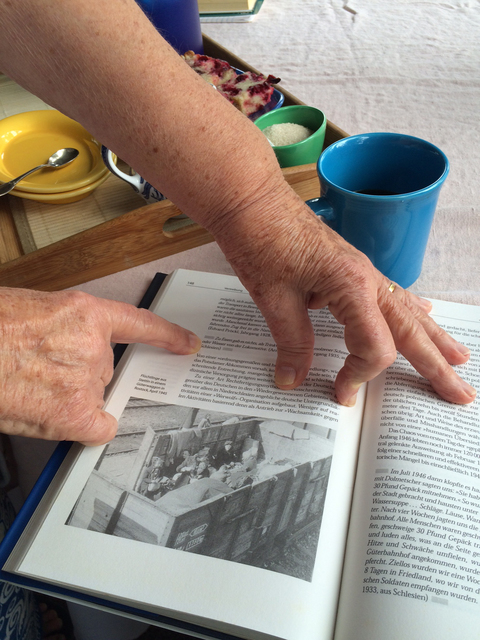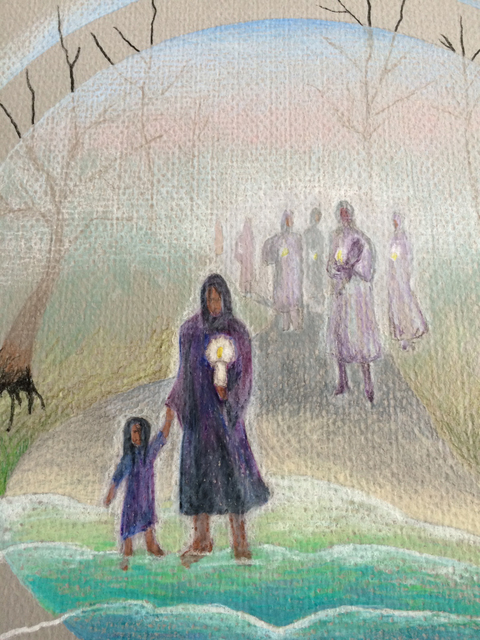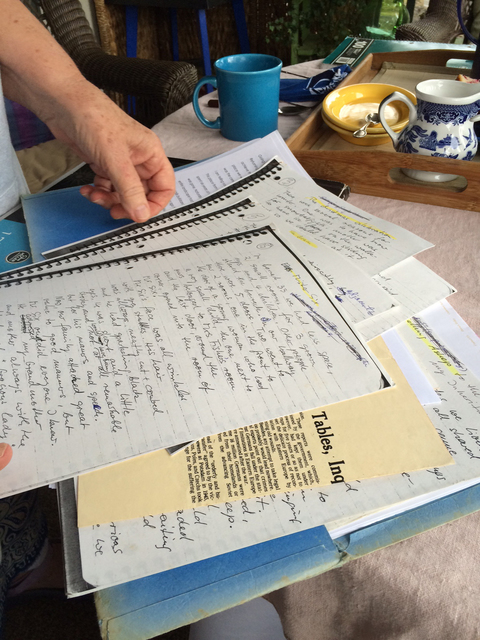Bearing Witness: Ocean View woman hears echoes from her own early years in today’s refugee crisis
OCEAN VIEW — Seven decades ago, the deep blue water of the Baltic Sea helped Brigitte Cooper survive.
It represented — glistening in the sun or brooding under dark clouds — a link beyond the horizon to the rest of the world.
Away from misery.
Away from wondering if she’d ever have a place to call home again.
It gave peace of mind to Cooper as she fought to survive the hunger and inhumanity of a German refugee camp after World War II.
“When you lose your homeland, you have to find something that ties things together for you,” she said.
From her living room in Ocean View, Cooper has watched the Syrian refugee crisis develop — culminating with the recent Paris terror attacks and the ensuing tide of concern as U.S. lawmakers join world leaders in erecting roadblocks against the influx — with a heavy heart.
Some lawmakers have demanded tighter screening for the refugees fleeing war torn Syria and Iraq as a precaution of introducing people into their countries with potentially extremist backgrounds. It’s an anxiety that accelerated after a Syrian passport was discovered on one of the Paris attack suspects.
Cooper, 74, finds it impossible to equate the concept of terrorism with her own six years living as a “camp person” in Germany’s far north.
She lived with eight other people in a two-room barrack, was fed watery soup each day, huddled around a small wood stove in the winter and went to sleep in all of her clothes while the wind puffed bitterly at the board-and-batten walls.
Cooper’s father, a German officer, had been killed returning from the Russian front in 1944. As the war ended, what remained of Cooper’s family was pushed out of the eastern territories of Germany that were being returned to Poland.
When she left a home near Poznan she would never return to, Cooper was 4 years old. Her mother carried her baby sister and a single suitcase. Among the few belongings was one spoon for each of them.
The camp was situated five minutes from the beach near the Danish border. Cooper and her sister were free to roam the open spaces and gather berries in the woods during the summer.
“It was heaven,” Cooper said. “That was when my relationship with the water got intense.”
Memories and a new life
Her memories of those days: A bowl of rice offered in kindness by a stranger, a crowded train station with refugees loading onto box cars, her grandmother’s whispered stories of pine forests she would never see again.
But six hard years as a refugee paid off.
Cooper, who declined to be photographed for this report but sat down with a reporter to detail her account, was 11 when her family was able to move out of the camp. They drifted around post-war Germany for a couple of years, then became established in a small apartment and received a small pension from the father’s military service.
It was that economic boost and an accepting country that turned her life around.
Cooper eventually attended art school and was working in Ireland training local women to work in a greeting card company when she met John Cooper, a traveling American. They were married shortly after and moved to the U.S. mainland.
But the images of those early years stayed, unrelenting, and some have become her ghosts — companions that have followed her over continents and decades.
“I can see the people, the grayness of everything,” Cooper said. “And the man who held the dead woman in his arms. The look on his face and the look on her face and her not moving at all, and the family sitting around the little stove.”
These impressions and others are detailed in a collection of stories that Cooper has begun putting down on paper.
She has written a couple of dozen of them. She would like to bind and reproduce copies for her family, but has no intention of publishing the work.
“I started writing them because I wanted my kids to know, and I wanted my sister’s kids to know,” she said. “And I wrote it down because I felt like I had to bear witness to what was happening.”
Cooper’s family on her mother’s side was influenced by Dietrich Bonhoeffer, an anti-Nazi dissident. Her father, although in the German Army, was not strongly aligned with the Nazis, Cooper said.
“What can you do against the Nazis?” she said. “A lot of people tried.”
Today’s plight
As the world’s latest conflicts produce new streams of displaced humanity, Cooper is bearing witness again. Relatives and friends who are in Europe report to her on how life there has changed.
“A friend in Hamburg told me last month that every public space, every arena, every sports hall, is totally filled with refugees,” she said. “The civic life you had before is totally changed.”
Cooper is preoccupied with the fate of children and the effect that war has on them.
“What you see during that time you can’t really put aside. It will influence everything that comes after in your life,” she said. “By the time you’re 11 or 12, you are pretty much set out on the path you will be taking.”
Cooper applauded Gov. David Ige’s welcoming stance toward the Syrian refugees, although Ige later clarified that he does not decide what refugees enter Hawaii.
“It is the human thing to do,” she said. “If terrorists want to come to this country, they have easier ways to get in than spending months jumping through hoops.”
Sweden has openly welcomed refugees for decades. Samantha Larsen, a chef in that country’s second largest city, Gothenburg, is active in several groups providing relief as the country grapples with this latest surge from Syria.
“I cook and deliver food and water to centers and to the central stations where they arrive,” Larsen said by text this week. “What these people have been through! The extreme right is growing and their common sense and humanity is totally absent. Ignorance and fear feed their cause. Still, we are always stronger and they are well outnumbered.”
Cooper sees history being repeated again, and again, on the backs of women and children. She wonders why men allow themselves to be talked into fighting. One day there may be a Syria they can return to, but at the moment, Cooper said, it doesn’t look good now.
“Being a refugee changes you into something else,” Cooper said. “Your past is separated from the now and the future, and you can never get back.”





